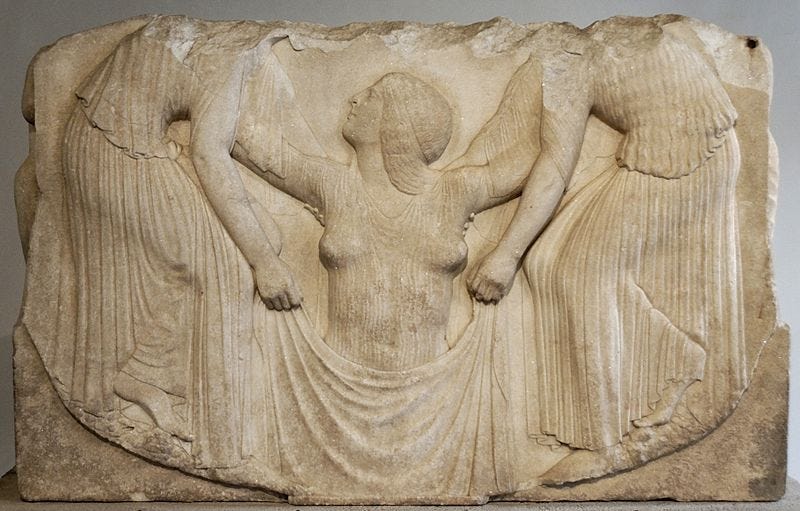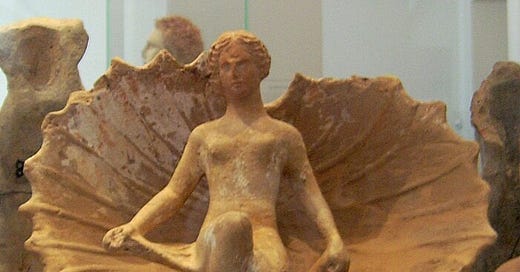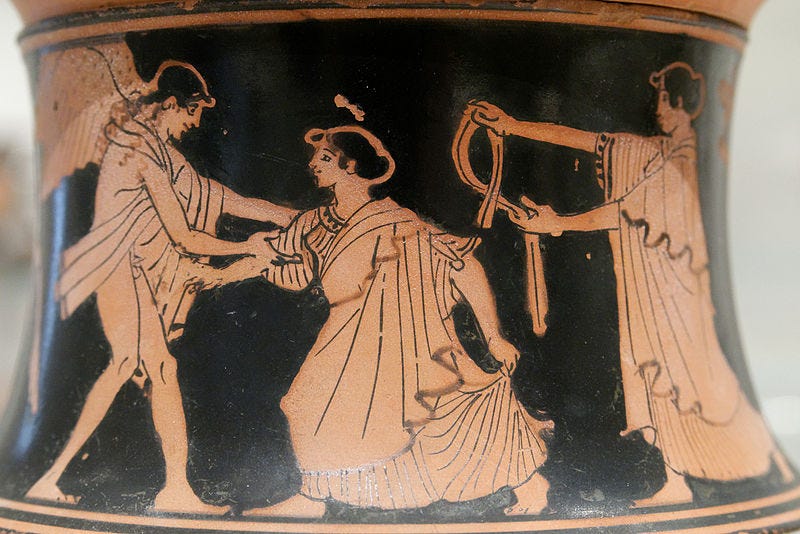This post is a continuation of my substack on the Iliad. All proceeds from the substack are donated to classics adjacent non-profits on a monthly basis.
One of the most well-known passages of Iliad 5 is when Athena spurs Diomedes to wound Aphrodite. The goddess of sex flees the battlefield and goes to be comforted by her mother.
Hom. Iliad 5.370-4
Then divine Aphrodite fell to the knees of Diône
Her own mother. She took her own daughter into her arms.
She touched her with her hand, named her, and spoke:
“Dear child, who of the Olympians has done these kinds of things to you,
Pointlessly, as if you were doing something wicked in the open?”ἣ δ’ ἐν γούνασι πῖπτε Διώνης δῖ’ ᾿Αφροδίτη
μητρὸς ἑῆς· ἣ δ’ ἀγκὰς ἐλάζετο θυγατέρα ἥν,
χειρί τέ μιν κατέρεξεν ἔπος τ’ ἔφατ’ ἐκ τ’ ὀνόμαζε·
τίς νύ σε τοιάδ’ ἔρεξε φίλον τέκος Οὐρανιώνων
μαψιδίως, ὡς εἴ τι κακὸν ῥέζουσαν ἐνωπῇ;
Once Aphrodite tells her the story, her mother then goes on to provide her a catalogue of gods who had to endure wounding by mortals. While the passage is amusing, it produces a little dissonance based largely on the significant detail of Aphrodite having a mother.
Schol. D ad. Hom. Il. 5.374
“Note that according to Hesiod, Aphrodite is the product of Ouranos’ genitals and the sea, but according to Homer, she is from Diône and Zeus.
᾿Ιστέον δὲ, ὅτι, κατὰ μὲν ῾Ησίοδον, ἡ
᾿Αφροδίτη γίγνεται ἐκ τοῦ Οὐρανοῦ τῶν
αἰδοίων, καὶ τῆς θαλάσσης· κατὰ δὲ
῞Ομηρον, ἐκ Διώνης καὶ Διός.
An instructive detail here is that the scholion here doesn’t take a stance about whether either or not Homer or Hesiod are “correct” or one is prior to another, and I think this is pretty important. From a narrative perspective each genealogy makes sense for the story in question: Aphrodite is a powerful elemental force in Hesiod’s Theogony and there is both poetic and political logic behind her birth from Ouranos’ testicles. In the Homeric tradition, this is more complicated. Zeus needs to humiliate Aphrodite in the Homeric Hymn to Aphrodite, where he ‘gets back’ at her for infecting the gods with lust by inducing her to have sex with the mortal Anchises. In the Iliad, Aphrodite is rendered subordinate to Zeus as one of his children. Aphrodite is often mentioned as a daughter of Zeus (as G. S. Kirk notes in his Cambridge commentary on the Iliad), but this is the only place we hear about her mother. To make it a little more bewildering, Diône seems top merely be a feminine form of Zeus (cf. the genitive Dios).
Frederick Combellack writes in his 1976 article “Homer the Innovator” that “any person who spends very much time in the study of the Homeric poems will almost certainly find himself involved, perhaps with regret, in the study of Homeric scholarship” (44). He drops this “diss track” by way of introducing an argument against the very idea that Homeric poetry could “innovate” or “invent” new detail, an assertion supported by many scholars in the twentieth century, dismissed by Combellack as being possible, but implausible based on our evidence.

While I don’t necessarily share Combellack’s aversion to reading Homeric scholarship, despite a weighty tradition mocking its pedantry going all the way back to Seneca (and likely earlier, given the evidence of Palladas the Alexandrian poet), I do think the asperity of his comments point to an important problem in thinking about Homeric poetry: making any sense of the relationship between our ‘Homer’ and what may have come before.
The relationship between the Iliad and the Odyssey and antecedent ‘traditions’ is not just about mythological narratives: it pervades our view of Homeric language (the formula), devices (e.g. similes), as well as content. Indeed, a great deal of Homeric scholarship of the 20th century was engaged with this question in one way or another. (Sidenote, this is a topic that will always inspire debate: The first 45 minutes of my dissertation defense in 2007 was occupied by my readers debating among themselves the meaning of the word ‘tradition’ in relation to the Iliad.)
I have discussed neoanalytical approaches before, and I don’t really want to recap that. Here I am interested in two problems presented by the nature of Homeric poetry itself: First, Homeric poetry is generically meant to seem old and authoritative, without having to actually be so. Second, Greek poetry and myth in general have a very different approach to veracity or fidelity than a culture immersed in fixed textual traditions like ours might expect.
For the first problem, I always find it useful to flip our belief about Homeric poetry on its head: what if, instead of assuming that Homeric poetry stands as the authoritative origins of Trojan war narratives (and other myths) it stands at the end of a certain kind of flexible tradition, imposing an authoritative order only over time thanks to a privileged cultural position. I find starting from this approach useful especially with other archaic and classical age poets because we can’t actually know what ‘Homer’ they were exposed to and it is strange to think that epic performance was not shaped by other genres as well.
For the second challenge, I often think back to what Hesiod announces before the cosmogonic narrative of the Theogony even begins. The Muses approach ‘Hesiod’ while he is tending his flocks:
Theogony 26-28
“Rustic shepherds, wretched reproaches, nothing but bellies,
We know how to say many lies similar to the truth
And we know how to speak the truth when we want to.”“ποιμένες ἄγραυλοι, κάκ’ ἐλέγχεα, γαστέρες οἶον,
ἴδμεν ψεύδεα πολλὰ λέγειν ἐτύμοισιν ὁμοῖα,
ἴδμεν δ’ εὖτ’ ἐθέλωμεν ἀληθέα γηρύσασθαι.”
When I teach myth I emphasize that while this passage can be taken as a disclaimer (i.e., you may know different stories than mine!) for communities of divergent, even conflicting narrative traditions, I think it is also a conditioning framework for setting aside concerns about veracity. Hesiod the narrator here attributes poetic authority to the Muses along with the ability to discern what is true from what is false. The result is that mortals simply cannot know and, therefore, probably shouldn’t worry about it.
But I have also taken recourse to ideas from scholars of memory to rethink moments like this. In studying memory systems, Martin Conway suggests that there are two forces in human memory: correspondence, which is about equivalence between details of ‘reality’ (or experience) and details of a story and coherence, which means that details make sense together in a narrative. When it comes to the way these systems operate in the human mind, not only does he argue that the memory systems have different neuro-anatomy, but he suggests that the episodic memory system (which prizes correspondence) developed earlier and is more basic to day-to-day survival than the autobiographical memory system which focuses more on coherence and is essential for the development of a goal or ‘identity’ driven self. The two systems are not exclusive—autobiographical memory selects from episodic memory in the creation of a coherent self.
In expanding these ideas to communities of audiences and narrative traditions, what I think we can say is that ancient audiences were accustomed to making sense of each story on its own terms, nonplussed by details that might conflict with other story traditions, because they belong to those other stories. The force of narrative coherence supersedes correspondence to ‘facts’ in other tales because what matters in each telling is the story in process. To an extent, these forces and the aesthetics they imply are operative throughout early Greek poetry (consider Pindar) and at play as well in the ‘innovations’ we see in Athenian Tragedy.
To return to book 5 of the Iliad: Aphrodite has a mother because it makes sense for the global context of the epic (where Zeus is the “father of gods and men”) and because it makes sense for this scene. Whether or not this is Homeric “invention” is almost beside the point. Certainly the simplicity of the name Diône and the lack of her presence in other narratives implies that this detail is important, even idiopathic to this (kind of) scene, but it tells us nothing about whether or not earlier versions of this theme including this detail or whether similar moments occurred in antecedent or parallel traditions. The challenge, as always, is to make sense of how this passage supports the Iliad we possess.
Cribbing from the Muses here: we cannot know if ‘Homer’ made something up, so should we bother worrying about it?
Other Posts on Iliad 5
Seeing (and Wounding) the Gods: Reading Iliad 5: On Theomachy, Homeric Gods, Aristeia, and Diomedes as a character
Two Ways to Decline Zeus: Paradigm, Text, and Story in Iliad 5: Dione’s story in Iliad 5; Homeric Language, previous myths; paradeigmata again
Short bibliography
Alden, Maureen Joan. “The rôle of Calypso in the Odyssey.” Antike und Abendland, vol. XXXI, 1985, pp. 97-107.
Barker, Elton T. E.. “The « Iliad »'s big swoon: a case of innovation within the epic tradition ?.” Trends in Classics, vol. 3, no. 1, 2011, pp. 1-17.
Barker, Elton T. E., and Joel P. Christensen. 2019. Homer's Thebes: Epic Rivalries and the Appropriation of Mythical Pasts. Hellenic Studies Series 84. Washington, DC: Center for Hellenic Studies
Berg, Nils and Haug, Dag Trygve Truslew. “Dividing Homer. 2,: Innovation vs. tradition in Homer : an overlooked piece of evidence.” Symbolae Osloenses, vol. 75, 2000, pp. 5-23. Doi: 10.1080/003976700300005811
Bruce K. Braswell. “Mythological Innovation in the Iliad.” Classical Quarterly 21 (1971) 16-26.
Christensen, Joel P.. “Innovation and tradition revisited: the near-synonymy of ἀμύνω and ἀλέξω as a case study in Homeric composition.” The Classical Journal, vol. 108, no. 3, 2012-2013, pp. 257-296.
Combellack, Frederick M.. “Homer the innovator.” Classical Philology, vol. LXXI, 1976, pp. 44-55.
Martin A. Conway. “Memory and the Self,” Journal of Memory and Language 53 (2005) 594-628.
Fantuzzi, Marco and Tsagalis, Christos. “« Kyklos », the Epic Cycle and Cyclic poetry.” The Greek Epic Cycle and its ancient reception : a companion. Eds. Fantuzzi, Marco and Tsagalis, Christos. Cambridge: Cambridge University Pr., 2015. 1-40.
Bernard Fenik. Homer: Tradition and Invention. Leiden, 1978.
Ingalls, Wayne B.. “Linguistic and formular innovation in the mythological digressions in the Iliad.” Phoenix, vol. XXXVI, 1982, pp. 201-202.
Jones, Peter. “Poetic invention: the fighting around Troy in the first nine years of the Trojan War.” Homer's world: fiction, tradition, reality. Eds. Andersen, Øivind and Dickie, Matthew W.. Papers from the Norwegian Institute at Athens; 3. Athens ; Bergen: Norwegian Institute at Athens, 1995. 101-111.
Mueller-Goldingen, Christian. “Tradition und Innovation: zu Stesichoros' Umgang mit dem Mythos.” L’Antiquité Classique, vol. 69, 2000, pp. 1-19. Doi: 10.3406/antiq.2000.2419
Nussbaum, Alan J.. “The Homeric formulary template and a linguistic innovation in the epics.” Language and meter. Eds. Gunkel, Dieter and Hackstein, Olav. Brill’s Studies in Indo-European Languages and Linguistics; 18. Leiden ; Boston (Mass.): Brill, 2018. 267-318.
Ready, Jonathan L.. The Homeric simile in comparative perspectives : oral traditions from Saudi Arabia to Indonesia. Oxford: Oxford University Pr., 2018.
David C. Rubin. “The Basic-systems Model of Episodic Memory,” Perspectives on Psychological Science 1 (2006) 277-311.
M. M. Willcock. “Mythological Paradeigmata in the Iliad.” Classical Quarterly 14 (1964) 141-151.
—,—. “Ad Hoc Invention in the Iliad.” Harvard Studies in Classical Philology 81 (1977) 41-53.






Wonderful post! I agree that it is unnecessary to think about whether Homer has "mistakes" or not, and it is also pointless to think from our mind and written culture about a possible mistake in something that was an oral tradition. I also think that the fact that the Iliad gives us a mother for Aphrodite reinforces her position as daughter of Zeus just like Helen. They need mothers to reinforce their status as sisters of the same father. Scroll 3 is really interesting in this regard.
Thanks for another great post, I love reading you!
Late to the game here, but I wanted to share some thoughts about this excellent essay. First, the correspondence/coherence framework rings true to me. My study has been of the Hittites and we have a text of theirs that writes two variants of one myth on the same (collection of) tablet(s). This being the Illuyanka myth (which parallels closely with Hesiod’s Typhon). They seem to have had no issue with variants in this instance. Further, they often had a multiplicity with their major gods as they would be claimed by major cities. The Storm God of X was ostensibly the same as the Storm God of Y, but could be treated differently depending on which city, X or Y, was the focus of the text.
Secondly, and relatedly, as to Homer making things up, it makes sense to me that he did. But, in the instance of Aphrodite/Dione, he is clearly borrowing (though likely not directly) from Gilgamesh, Tablet 6. There, Ishtar (goddess of love and war - Aphrodite) is spurned by Gilgamesh (Diomedes) and flees to heaven to complains to her father and mother, the sky god Anu (Zeus) and Antu (feminine form of Anu, just like Zeus/Dione if you ignore the genitive case part). Martin West has gone so far as to argue Homer jammed Dione in just to make the parallel work better.
Final note, related again - Hesiod’s story of Aphrodite’s parentage parallels very closely to the Hittite Kumarbi myth. I’ve always wondered why Homer and Hesiod chose two separate Near Eastern myths to be represented in their stories. ‘Chose’ is a strong word here as each likely got it from someone else. But, back along that line a choice was made.